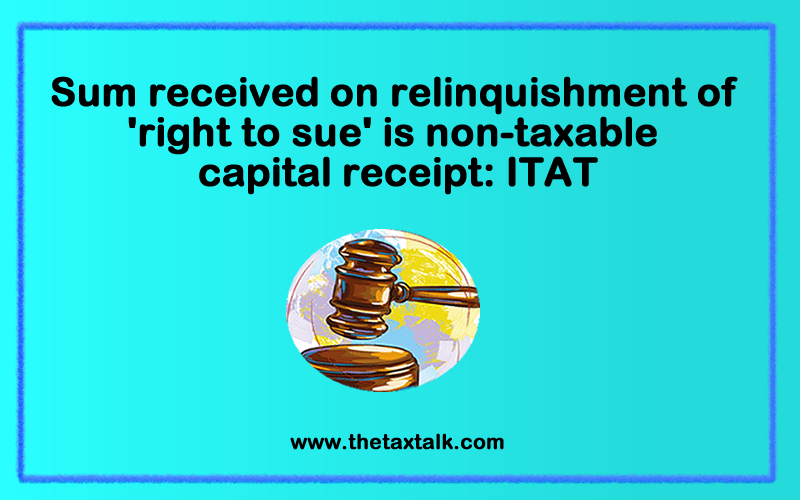![]()
Sum received on relinquishment of ‘right to sue’ is non-taxable capital receipt: ITAT
Facts:
a) Assessee-company entered into a development agreement by virtue of which a right in land was created in its favour by owner of land. Assessee’s case was that despite development agreement entered into by landlord, the landlord had decided to sell said land to other parties.
b) Assessee filed a suit in the Courts of law for specific performance of pre-emptive right to purchase the land. Later on, it received damages from the potential purchaser for relinquishment of ‘right to sue’ in the Courts of law for breach of development agreement.
c) Assessee claimed that ‘right to sue’ was a personal right which would not fall within sweep of definition of ‘capital asset’ under section 2(14), Consequently, damages received from potential purchaser were a non-taxable capital receipts.
d) Revenue rejected said claim and brought amount of damages as revenue receipts. Aggrieved-assessee filed the instant appeal before the ITAT.
The ITAT held in favour of assessee as under:
1) The essence of long list of judicial pronouncements cited by assessee was that section 6 of the Transfer of Property Act which uses the same expression ‘property of any kind’ in the context of transferability makes an exception in the case of a mere right to sue.
2) The decisions there under make it abundantly clear that the ‘right to sue’ for damages is not an actionable claim. It cannot be assigned. Transfer of such a right is opposed to public policy as it tantamounts to gambling in litigation.
3) Hence, such a ‘right to sue’ does not constitute a ‘capital asset ‘ which, in turn, has to be ‘an interest in property of any kind’. Despite the definition of expression ‘capital asset ‘ in the widest possible terms in Section 2(14), a right to a capital asset must fall within the expression ‘property of any kind’ subject to certain exclusions.
4) Not with standing widest import assigned to the term ‘property’ which signifies every possible interest which a person can hold and enjoy, the ‘ right to sue’ was a right in personam and such right could not certainly be transferred.
5) In order to attract the charge of tax on capital gains, the sine qua non is that the receipt must have originated in a ‘transfer ‘ within the meaning of section 45, read with section 2(47) of IT Act. In the absence of its transferability, damages received by assessee couldn’t be assessed as capital gains.

